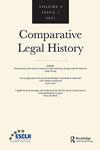谈判莫卧儿法律:一个跨越三个印度帝国的地主家庭
IF 0.5
Q2 LAW
引用次数: 3
摘要
(218)。在保留了这些条款的情况下,Fletcher发现了一些有趣的强制执行例子,尽管他得出结论,“皇家法院在劳工服务方面的主要职能是广告,而不是惩罚不称职的租户”(219)。考虑到这一时期动荡的政治历史,“监视、看管、招待和狩猎的准军事服务”(221)是租户最显著的职责之一,这也许并不令人惊讶。Fletcher的结论,第九章,试图将可继承的司法管辖区救赎为“一种充满活力的地方法律文化”(227),与之形成鲜明对比的是,它们更受欢迎的形象。出庭使社会精英能够“在当地的法律、政治和经济管辖权中发挥积极作用”,同时法院也“为农村社会的所有成员提供法律保护”(227)。有趣的是,法院的领土限制和权限都表明了“土地所有者对管辖权的放松或务实态度,与我们通常期望的法律体系的准确性相去甚远”(229)。这也可能表明,“在实践中,管辖权持有人的理论权力不如形成每个管辖区程序的当地情况重要”(230)。弗莱彻的书以1747年废除可继承管辖权而告终,之后皇家法院的管辖权被其他地方法院和官员吸收。总的来说,弗莱彻在这本书中介绍了对法庭记录的高度详细的研究结果,这增加了我们对法律和社会历史的理解。他经常对管辖权问题做出比以往更细致的解释,从而通过仔细的案例研究增加了我们理解的微妙性。然而,正如弗莱彻本人在书中的几段话中所指出的那样,苏格兰各地的宫廷之间似乎存在着重要的差异。因此,他的书对一个帝王法庭进行了有力的分析,可以对其他特许法庭的做法进行检验。本文章由计算机程序翻译,如有差异,请以英文原文为准。
Negotiating Mughal law: a family of landlords across three Indian empires
(218). Where such terms were preserved, Fletcher finds some interesting examples of enforcement, although he concludes that ‘[t]he main function of the regality court in relation to labour services was advertisement rather than the punishment of non-performing tenants’ (219). Given the tumultuous political history of the period, the fact that ‘the quasi military services of watching, warding, hosting, and hunting’ (221) are among the most notable duties on tenants is perhaps unsurprising. Fletcher’s conclusion, chapter nine, attempts to redeem heritable jurisdictions as being ‘a vibrant local legal culture’ (227) in contrast to their more damning popular image. Attendance at court enabled the social elite to have ‘an active role in a local legal, political, and economic jurisdiction’, while the courts also ‘offered legal protections for all members of rural society’ (227). Interestingly, both the court’s territorial limit and its competence speak to ‘a relaxed or pragmatic attitude to jurisdiction amongst landowners, far removed from the precision we often expect from the legal system’ (229). Potentially this also suggests that ‘the theoretical powers of jurisdiction holders mattered less in practice than the local circumstances which shaped procedures in each jurisdiction’ (230). Fletcher’s book concludes with the abolition of heritable jurisdictions in 1747, after which aspects of the regality court’s jurisdiction was absorbed by other local courts and office holders. Overall, Fletcher has in this book presented the results of a highly detailed study of the court records which adds to our understanding of both legal and social history. He often provides a more nuanced interpretation of jurisdictional questions than has previously been achieved, thereby increasing the subtlety of our understanding through careful case-study. However, as Fletcher himself identifies in several passages in the book, there appear to be important differences between regality courts across Scotland. His book therefore presents a powerful analysis of one regality court, against which the practice of other franchisal courts can be tested.
求助全文
通过发布文献求助,成功后即可免费获取论文全文。
去求助
来源期刊
CiteScore
1.70
自引率
0.00%
发文量
20
期刊介绍:
Comparative Legal History is an international and comparative review of law and history. Articles will explore both ''internal'' legal history (doctrinal and disciplinary developments in the law) and ''external'' legal history (legal ideas and institutions in wider contexts). Rooted in the complexity of the various Western legal traditions worldwide, the journal will also investigate other laws and customs from around the globe. Comparisons may be either temporal or geographical and both legal and other law-like normative traditions will be considered. Scholarship on comparative and trans-national historiography, including trans-disciplinary approaches, is particularly welcome.

 求助内容:
求助内容: 应助结果提醒方式:
应助结果提醒方式:


